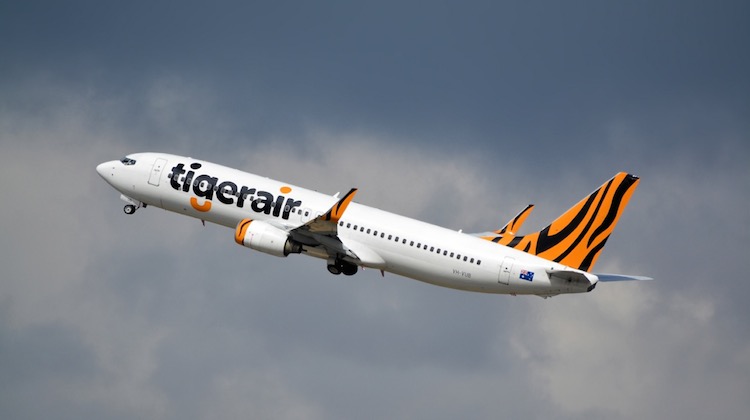Virgin Australia has moved one step closer to potentially deploying its low-cost carrier unit Tigerair Australia on international flights.
Australia’s International Air Services Commission (IASC) has approved Virgin Australia’s application to vary a number of its traffic rights agreements to include a condition permitting Tigerair Australia to utilise the allocated capacity.
The applications, made in August, covered Virgin Australia’s traffic rights for the Cook Islands, New Zealand, the Solomon Islands, Tonga and Vanuatu.
At the time, the company said the applications were “part of streamlining the economic regulatory arrangements underpinning our international operations”.
The IASC approved the request requests on November 30, noting in its decisions there was “public benefit arising from the proposed use of the capacity” by Tigerair Australia on the above routes.
“The Commission has come to the view that Tiger International is reasonably capable of obtaining any licences, permits or other approvals required to operate on and service the route; and of using the capacity allocated under the determination,” the IASC said.
TIGERAIR AUSTRALIA LAST FLEW INTERNATIONALLY IN 2017
Tigerair Australia previously operated international flights in 2016 and 2017.
In March 2016, the airline started flights to Bali from Adelaide, Melbourne and Perth with Boeing 737-800s, taking over flights previously operated by Virgin Australia.
Less than a year later, in February 2017, Tigerair Australia was forced to withdraw from Bali after after reaching an impasse with Indonesian regulators over its operating permits to serve the popular Indonesian tourist destination.
Since then, its focus has been on expanding in the Australian domestic market and pressing ahead with a fleet transition from Airbus A320s to Boeing 737-800s.

VIRGIN AUSTRALIA RAISED TASMAN ROLE FOR TIGERAIR AUSTRALIA FOLLOWING END OF AIR NEW ZEALAND-VIRGIN AUSTRALIA
Virgin Australia raised the prospect of Tigerair Australia being deployed on trans-Tasman routes after Air New Zealand announced it was walking away from its alliance with the Australian carrier in favour of going it alone in the trans-Tasman market.
Air New Zealand said it April one of the reasons for terminating the seven-year joint-venture, which officially ended on October 28 2018, was to deliver a more consistent customer experience with its own aircraft.
Since then, it has signed a codeshare agreement with Qantas for access to Australian domestic destinations it does not fly to. There was no codesharing or coordination on trans-Tasman services and the arrangement did not require regulator approval on either side of the Tasman.
Meanwhile, Virgin Australia has scheduled new flights to Auckland, Queenstown and Wellington – including a seasonal Newcastle-Auckland service – while Air New Zealand has boosted its schedule to Brisbane, the Gold Coast, Melbourne and Sydney.
Freed from the shackles of the alliance with Air New Zealand that required an alignment of on-board products and services, Virgin Australia was offering economy class passengers travelling between Australia and New Zealand a 23kg checkin allowance with every ticket, in addition to what the airline has described as a “substantial meal and drink”.
The airline has also announced a streamlined premium passenger lounge network for its international flights out of Australia and New Zealand for eligible members of its Velocity frequent flyer program.
Despite Tigerair Australia being one step closer to expanding its network beyond Australia, it should be noted both Virgin Australia chief executive John Borghetti and Tigerair Australia chief executive Merren McArthur have cautioned not to expect that move any time soon.
“When the alliance was terminated, I said at the time it would free us up to do some things that we would not otherwise do such as potentially putting Tiger on the Tasman, potentially upgrading our product, opening lounges et cetera,” Borghetti told reporters after the company’s annual general meeting on November 7.
“That’s what we are doing. I mean, we are not doing all of those things now, but the product and the schedules and everything else we are.”
Similarly, McArthur said at the CAPA – Centre for Aviation Australia Pacific aviation and corporate travel summit in Sydney in August her focus was on the airline’s operational performance and the domestic market.
“Right now, I’m just focused on optimising our domestic network, plenty of opportunities there,” McArthur said.
“I think we will continually assess that market as it moves through these changes and if there’s an opportunity down the track we will assess it and it might be an opportunity for Tiger but nothing in plan at the moment.
“The airline has been through a massive amount of change over the last 18 months and that’s impacted the business performance so my focus is actually get it back to basics, back focused on its operational performance.”
VIDEO: A look at Virgin Australia’s wifi offering from the its YouTube channel. The airline is rolling out wifi across its fleet, including on the Boeing 737-800s that are flown on its trans-Tasman services




